Analyzing the Role of Ethics in Financial Reporting and Performance
VerifiedAdded on 2022/08/12
|20
|6071
|54
Report
AI Summary
This research paper investigates the critical role of ethics in financial reporting quality and its subsequent impact on a company's financial performance. The study explores the ethical dilemmas faced by accounting professionals and the importance of ethical codes in maintaining stakeholder trust and preventing financial misstatements. It delves into various theoretical frameworks, including agency theory, institutional theory, and the theory of rights, to understand the underlying principles of accounting ethics. The report examines the significance of ethical behavior in reducing fraud, mismanagement, and corruption within organizations. It highlights the positive correlation between accounting ethics and audit quality, emphasizing the need for standardized and strictly enforced ethical standards. The paper also addresses factors influencing the relationship between financial performance and the quality of financial reporting, providing valuable insights for decision-makers, managers, and researchers in the field.
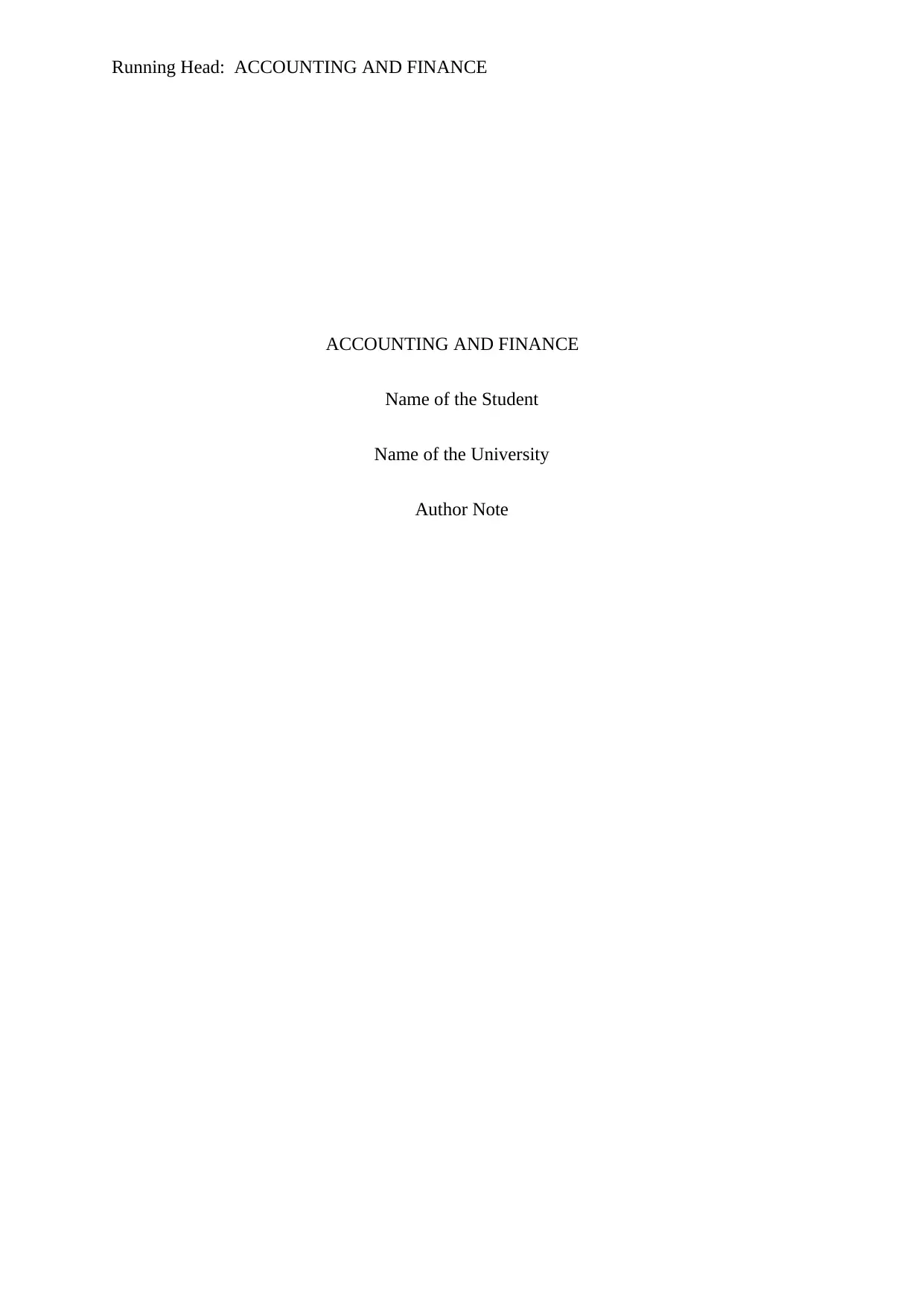
Running Head: ACCOUNTING AND FINANCE
ACCOUNTING AND FINANCE
Name of the Student
Name of the University
Author Note
ACCOUNTING AND FINANCE
Name of the Student
Name of the University
Author Note
Paraphrase This Document
Need a fresh take? Get an instant paraphrase of this document with our AI Paraphraser
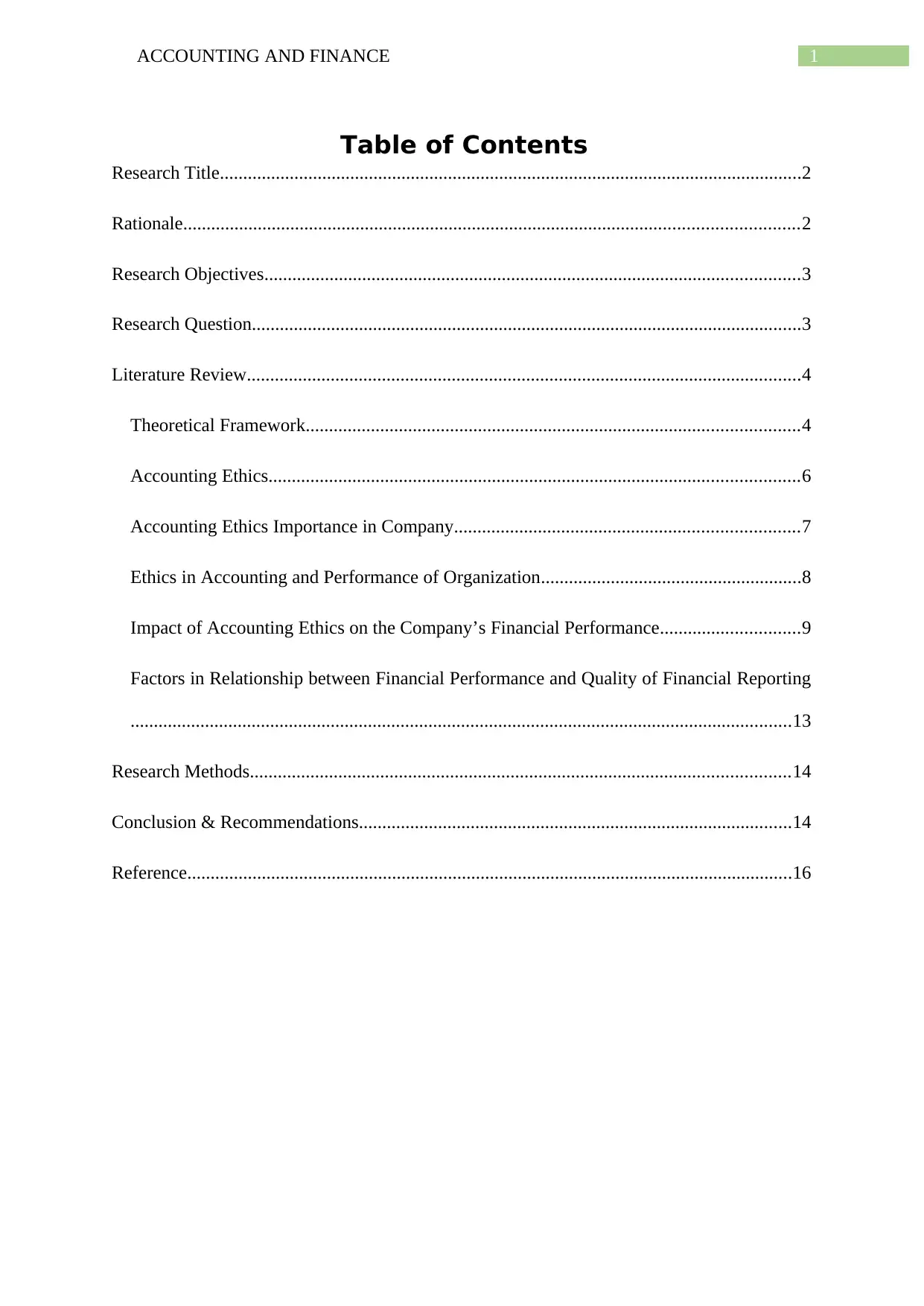
1ACCOUNTING AND FINANCE
Table of Contents
Research Title.............................................................................................................................2
Rationale....................................................................................................................................2
Research Objectives...................................................................................................................3
Research Question......................................................................................................................3
Literature Review.......................................................................................................................4
Theoretical Framework..........................................................................................................4
Accounting Ethics..................................................................................................................6
Accounting Ethics Importance in Company..........................................................................7
Ethics in Accounting and Performance of Organization........................................................8
Impact of Accounting Ethics on the Company’s Financial Performance..............................9
Factors in Relationship between Financial Performance and Quality of Financial Reporting
..............................................................................................................................................13
Research Methods....................................................................................................................14
Conclusion & Recommendations.............................................................................................14
Reference..................................................................................................................................16
Table of Contents
Research Title.............................................................................................................................2
Rationale....................................................................................................................................2
Research Objectives...................................................................................................................3
Research Question......................................................................................................................3
Literature Review.......................................................................................................................4
Theoretical Framework..........................................................................................................4
Accounting Ethics..................................................................................................................6
Accounting Ethics Importance in Company..........................................................................7
Ethics in Accounting and Performance of Organization........................................................8
Impact of Accounting Ethics on the Company’s Financial Performance..............................9
Factors in Relationship between Financial Performance and Quality of Financial Reporting
..............................................................................................................................................13
Research Methods....................................................................................................................14
Conclusion & Recommendations.............................................................................................14
Reference..................................................................................................................................16
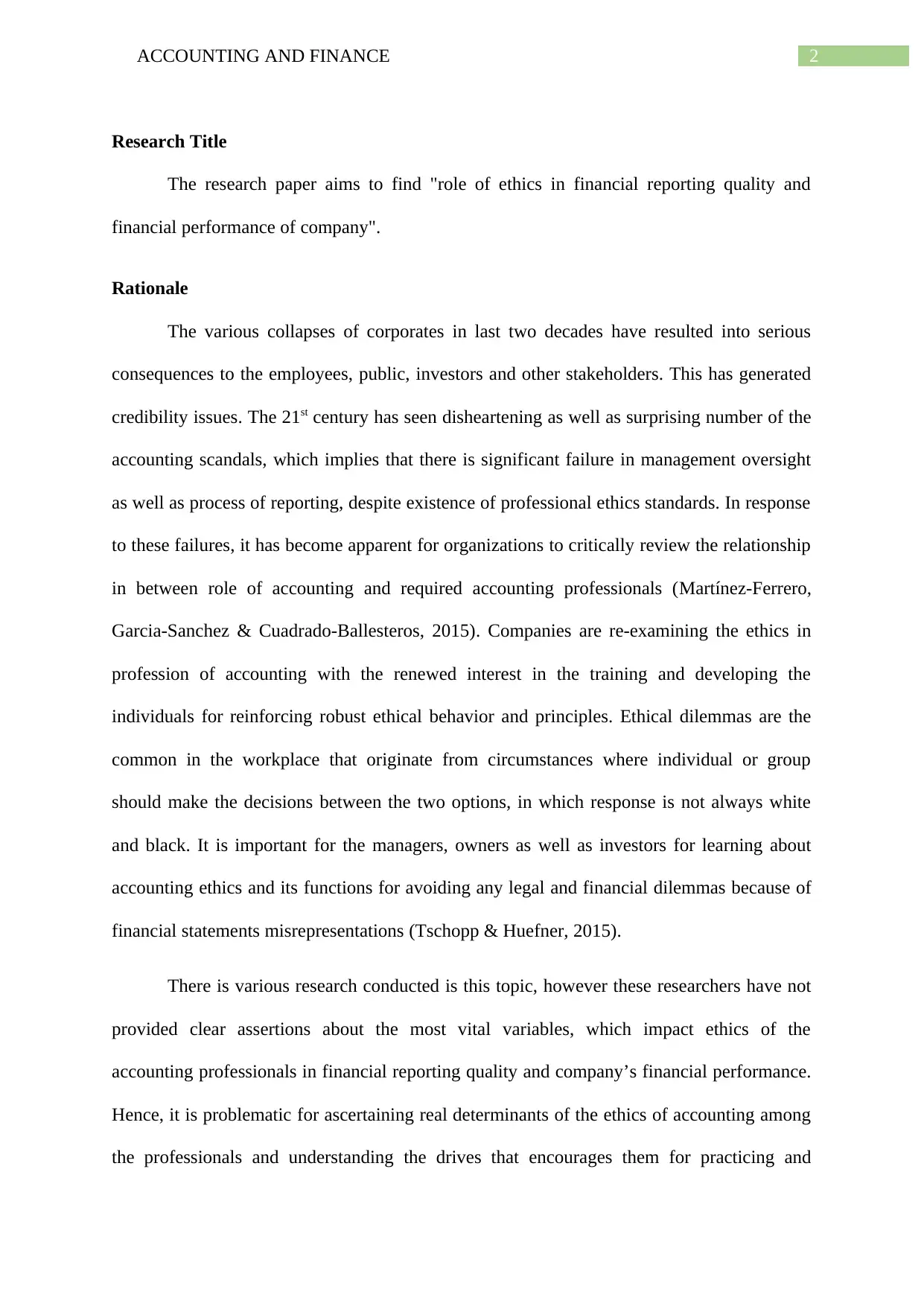
2ACCOUNTING AND FINANCE
Research Title
The research paper aims to find "role of ethics in financial reporting quality and
financial performance of company".
Rationale
The various collapses of corporates in last two decades have resulted into serious
consequences to the employees, public, investors and other stakeholders. This has generated
credibility issues. The 21st century has seen disheartening as well as surprising number of the
accounting scandals, which implies that there is significant failure in management oversight
as well as process of reporting, despite existence of professional ethics standards. In response
to these failures, it has become apparent for organizations to critically review the relationship
in between role of accounting and required accounting professionals (Martínez‐Ferrero,
Garcia‐Sanchez & Cuadrado‐Ballesteros, 2015). Companies are re-examining the ethics in
profession of accounting with the renewed interest in the training and developing the
individuals for reinforcing robust ethical behavior and principles. Ethical dilemmas are the
common in the workplace that originate from circumstances where individual or group
should make the decisions between the two options, in which response is not always white
and black. It is important for the managers, owners as well as investors for learning about
accounting ethics and its functions for avoiding any legal and financial dilemmas because of
financial statements misrepresentations (Tschopp & Huefner, 2015).
There is various research conducted is this topic, however these researchers have not
provided clear assertions about the most vital variables, which impact ethics of the
accounting professionals in financial reporting quality and company’s financial performance.
Hence, it is problematic for ascertaining real determinants of the ethics of accounting among
the professionals and understanding the drives that encourages them for practicing and
Research Title
The research paper aims to find "role of ethics in financial reporting quality and
financial performance of company".
Rationale
The various collapses of corporates in last two decades have resulted into serious
consequences to the employees, public, investors and other stakeholders. This has generated
credibility issues. The 21st century has seen disheartening as well as surprising number of the
accounting scandals, which implies that there is significant failure in management oversight
as well as process of reporting, despite existence of professional ethics standards. In response
to these failures, it has become apparent for organizations to critically review the relationship
in between role of accounting and required accounting professionals (Martínez‐Ferrero,
Garcia‐Sanchez & Cuadrado‐Ballesteros, 2015). Companies are re-examining the ethics in
profession of accounting with the renewed interest in the training and developing the
individuals for reinforcing robust ethical behavior and principles. Ethical dilemmas are the
common in the workplace that originate from circumstances where individual or group
should make the decisions between the two options, in which response is not always white
and black. It is important for the managers, owners as well as investors for learning about
accounting ethics and its functions for avoiding any legal and financial dilemmas because of
financial statements misrepresentations (Tschopp & Huefner, 2015).
There is various research conducted is this topic, however these researchers have not
provided clear assertions about the most vital variables, which impact ethics of the
accounting professionals in financial reporting quality and company’s financial performance.
Hence, it is problematic for ascertaining real determinants of the ethics of accounting among
the professionals and understanding the drives that encourages them for practicing and
⊘ This is a preview!⊘
Do you want full access?
Subscribe today to unlock all pages.

Trusted by 1+ million students worldwide
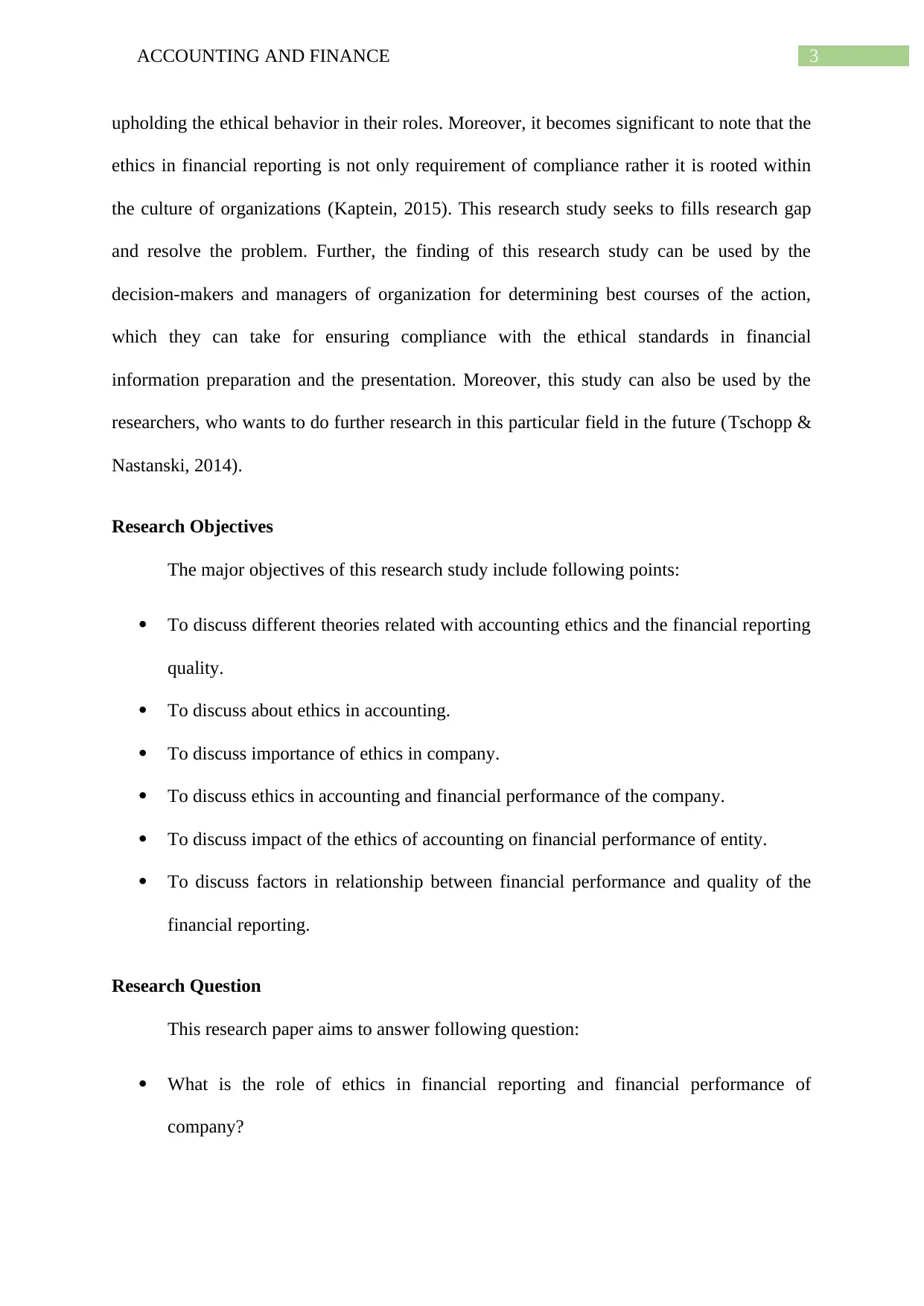
3ACCOUNTING AND FINANCE
upholding the ethical behavior in their roles. Moreover, it becomes significant to note that the
ethics in financial reporting is not only requirement of compliance rather it is rooted within
the culture of organizations (Kaptein, 2015). This research study seeks to fills research gap
and resolve the problem. Further, the finding of this research study can be used by the
decision-makers and managers of organization for determining best courses of the action,
which they can take for ensuring compliance with the ethical standards in financial
information preparation and the presentation. Moreover, this study can also be used by the
researchers, who wants to do further research in this particular field in the future (Tschopp &
Nastanski, 2014).
Research Objectives
The major objectives of this research study include following points:
To discuss different theories related with accounting ethics and the financial reporting
quality.
To discuss about ethics in accounting.
To discuss importance of ethics in company.
To discuss ethics in accounting and financial performance of the company.
To discuss impact of the ethics of accounting on financial performance of entity.
To discuss factors in relationship between financial performance and quality of the
financial reporting.
Research Question
This research paper aims to answer following question:
What is the role of ethics in financial reporting and financial performance of
company?
upholding the ethical behavior in their roles. Moreover, it becomes significant to note that the
ethics in financial reporting is not only requirement of compliance rather it is rooted within
the culture of organizations (Kaptein, 2015). This research study seeks to fills research gap
and resolve the problem. Further, the finding of this research study can be used by the
decision-makers and managers of organization for determining best courses of the action,
which they can take for ensuring compliance with the ethical standards in financial
information preparation and the presentation. Moreover, this study can also be used by the
researchers, who wants to do further research in this particular field in the future (Tschopp &
Nastanski, 2014).
Research Objectives
The major objectives of this research study include following points:
To discuss different theories related with accounting ethics and the financial reporting
quality.
To discuss about ethics in accounting.
To discuss importance of ethics in company.
To discuss ethics in accounting and financial performance of the company.
To discuss impact of the ethics of accounting on financial performance of entity.
To discuss factors in relationship between financial performance and quality of the
financial reporting.
Research Question
This research paper aims to answer following question:
What is the role of ethics in financial reporting and financial performance of
company?
Paraphrase This Document
Need a fresh take? Get an instant paraphrase of this document with our AI Paraphraser
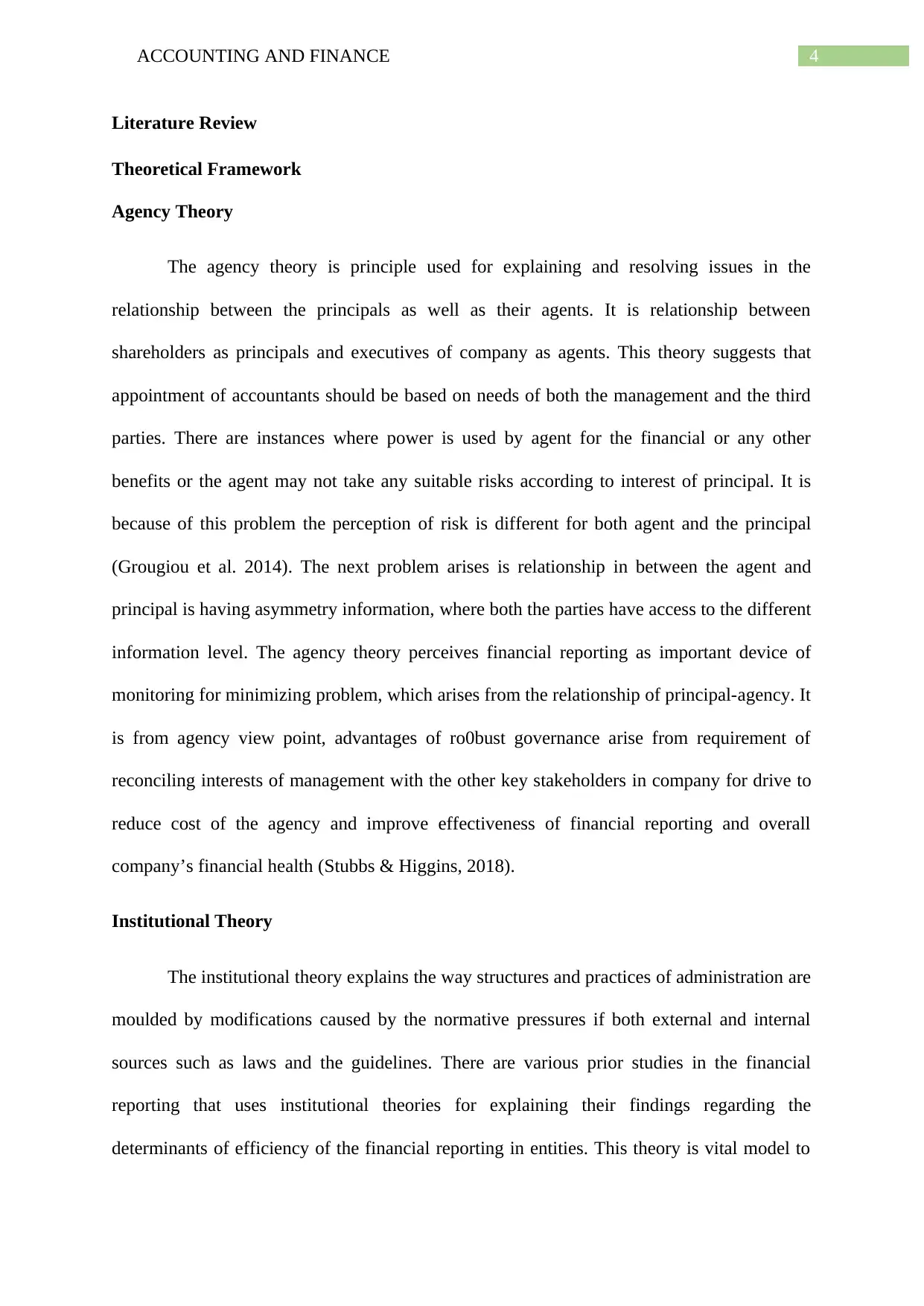
4ACCOUNTING AND FINANCE
Literature Review
Theoretical Framework
Agency Theory
The agency theory is principle used for explaining and resolving issues in the
relationship between the principals as well as their agents. It is relationship between
shareholders as principals and executives of company as agents. This theory suggests that
appointment of accountants should be based on needs of both the management and the third
parties. There are instances where power is used by agent for the financial or any other
benefits or the agent may not take any suitable risks according to interest of principal. It is
because of this problem the perception of risk is different for both agent and the principal
(Grougiou et al. 2014). The next problem arises is relationship in between the agent and
principal is having asymmetry information, where both the parties have access to the different
information level. The agency theory perceives financial reporting as important device of
monitoring for minimizing problem, which arises from the relationship of principal-agency. It
is from agency view point, advantages of ro0bust governance arise from requirement of
reconciling interests of management with the other key stakeholders in company for drive to
reduce cost of the agency and improve effectiveness of financial reporting and overall
company’s financial health (Stubbs & Higgins, 2018).
Institutional Theory
The institutional theory explains the way structures and practices of administration are
moulded by modifications caused by the normative pressures if both external and internal
sources such as laws and the guidelines. There are various prior studies in the financial
reporting that uses institutional theories for explaining their findings regarding the
determinants of efficiency of the financial reporting in entities. This theory is vital model to
Literature Review
Theoretical Framework
Agency Theory
The agency theory is principle used for explaining and resolving issues in the
relationship between the principals as well as their agents. It is relationship between
shareholders as principals and executives of company as agents. This theory suggests that
appointment of accountants should be based on needs of both the management and the third
parties. There are instances where power is used by agent for the financial or any other
benefits or the agent may not take any suitable risks according to interest of principal. It is
because of this problem the perception of risk is different for both agent and the principal
(Grougiou et al. 2014). The next problem arises is relationship in between the agent and
principal is having asymmetry information, where both the parties have access to the different
information level. The agency theory perceives financial reporting as important device of
monitoring for minimizing problem, which arises from the relationship of principal-agency. It
is from agency view point, advantages of ro0bust governance arise from requirement of
reconciling interests of management with the other key stakeholders in company for drive to
reduce cost of the agency and improve effectiveness of financial reporting and overall
company’s financial health (Stubbs & Higgins, 2018).
Institutional Theory
The institutional theory explains the way structures and practices of administration are
moulded by modifications caused by the normative pressures if both external and internal
sources such as laws and the guidelines. There are various prior studies in the financial
reporting that uses institutional theories for explaining their findings regarding the
determinants of efficiency of the financial reporting in entities. This theory is vital model to
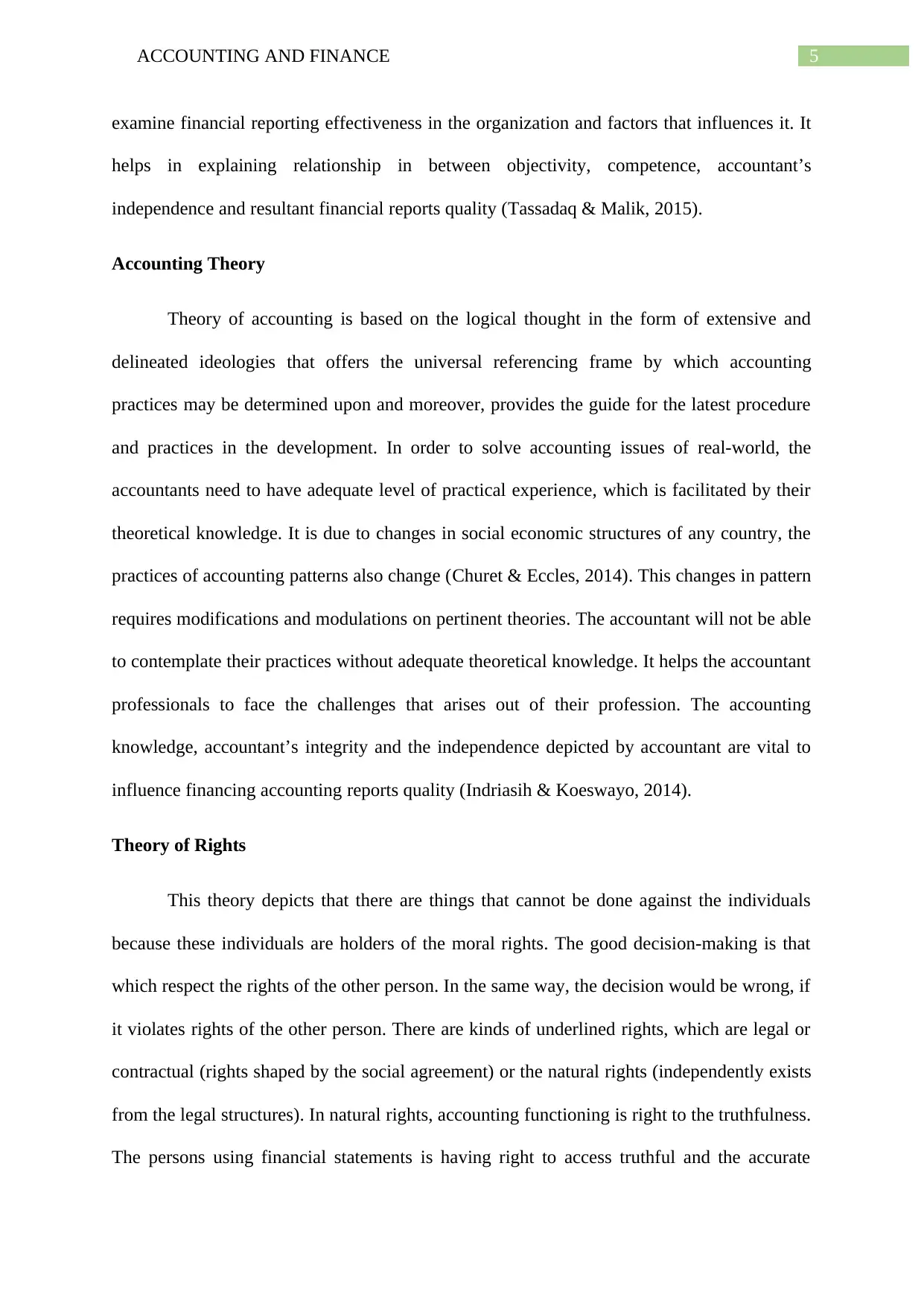
5ACCOUNTING AND FINANCE
examine financial reporting effectiveness in the organization and factors that influences it. It
helps in explaining relationship in between objectivity, competence, accountant’s
independence and resultant financial reports quality (Tassadaq & Malik, 2015).
Accounting Theory
Theory of accounting is based on the logical thought in the form of extensive and
delineated ideologies that offers the universal referencing frame by which accounting
practices may be determined upon and moreover, provides the guide for the latest procedure
and practices in the development. In order to solve accounting issues of real-world, the
accountants need to have adequate level of practical experience, which is facilitated by their
theoretical knowledge. It is due to changes in social economic structures of any country, the
practices of accounting patterns also change (Churet & Eccles, 2014). This changes in pattern
requires modifications and modulations on pertinent theories. The accountant will not be able
to contemplate their practices without adequate theoretical knowledge. It helps the accountant
professionals to face the challenges that arises out of their profession. The accounting
knowledge, accountant’s integrity and the independence depicted by accountant are vital to
influence financing accounting reports quality (Indriasih & Koeswayo, 2014).
Theory of Rights
This theory depicts that there are things that cannot be done against the individuals
because these individuals are holders of the moral rights. The good decision-making is that
which respect the rights of the other person. In the same way, the decision would be wrong, if
it violates rights of the other person. There are kinds of underlined rights, which are legal or
contractual (rights shaped by the social agreement) or the natural rights (independently exists
from the legal structures). In natural rights, accounting functioning is right to the truthfulness.
The persons using financial statements is having right to access truthful and the accurate
examine financial reporting effectiveness in the organization and factors that influences it. It
helps in explaining relationship in between objectivity, competence, accountant’s
independence and resultant financial reports quality (Tassadaq & Malik, 2015).
Accounting Theory
Theory of accounting is based on the logical thought in the form of extensive and
delineated ideologies that offers the universal referencing frame by which accounting
practices may be determined upon and moreover, provides the guide for the latest procedure
and practices in the development. In order to solve accounting issues of real-world, the
accountants need to have adequate level of practical experience, which is facilitated by their
theoretical knowledge. It is due to changes in social economic structures of any country, the
practices of accounting patterns also change (Churet & Eccles, 2014). This changes in pattern
requires modifications and modulations on pertinent theories. The accountant will not be able
to contemplate their practices without adequate theoretical knowledge. It helps the accountant
professionals to face the challenges that arises out of their profession. The accounting
knowledge, accountant’s integrity and the independence depicted by accountant are vital to
influence financing accounting reports quality (Indriasih & Koeswayo, 2014).
Theory of Rights
This theory depicts that there are things that cannot be done against the individuals
because these individuals are holders of the moral rights. The good decision-making is that
which respect the rights of the other person. In the same way, the decision would be wrong, if
it violates rights of the other person. There are kinds of underlined rights, which are legal or
contractual (rights shaped by the social agreement) or the natural rights (independently exists
from the legal structures). In natural rights, accounting functioning is right to the truthfulness.
The persons using financial statements is having right to access truthful and the accurate
⊘ This is a preview!⊘
Do you want full access?
Subscribe today to unlock all pages.

Trusted by 1+ million students worldwide
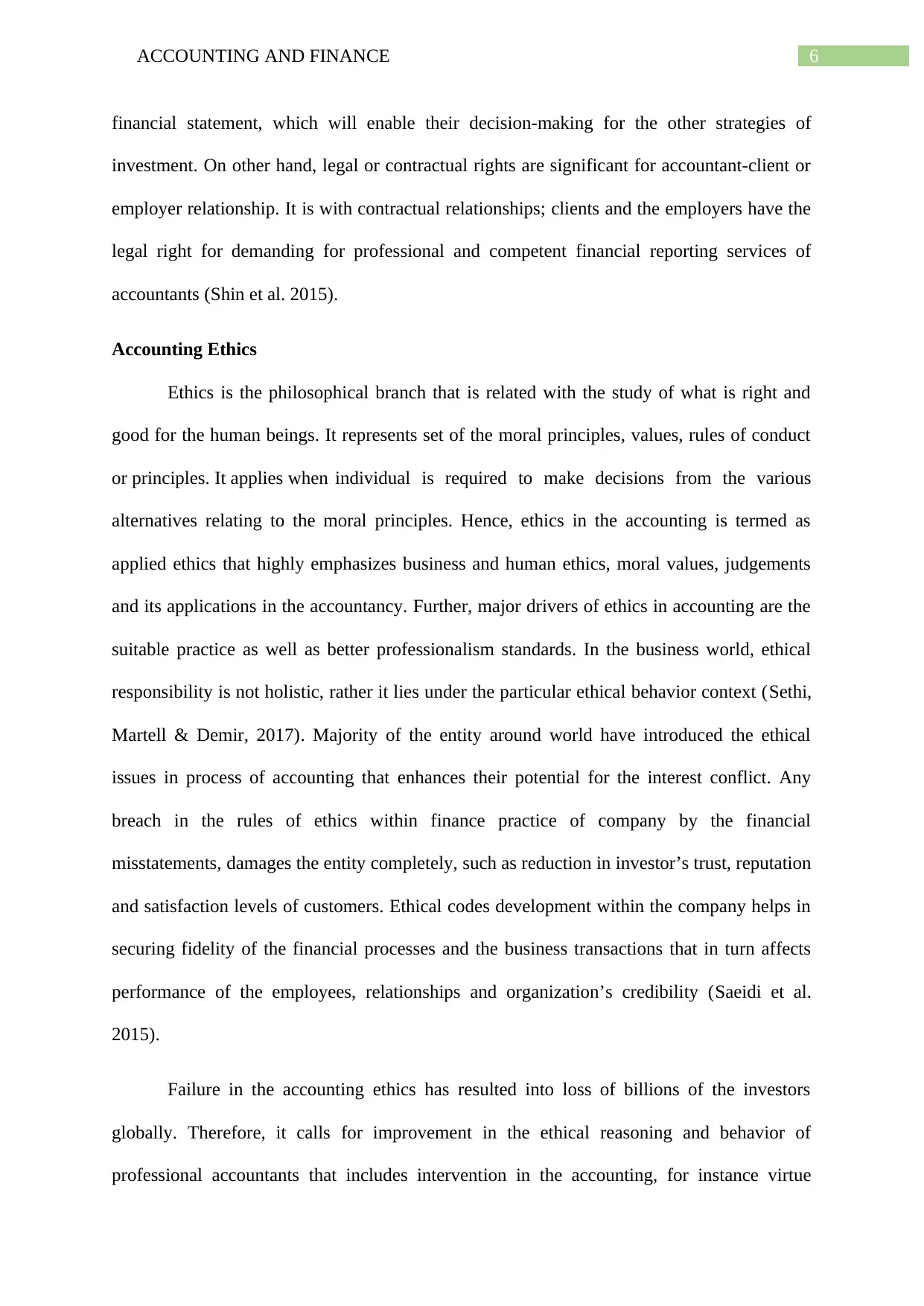
6ACCOUNTING AND FINANCE
financial statement, which will enable their decision-making for the other strategies of
investment. On other hand, legal or contractual rights are significant for accountant-client or
employer relationship. It is with contractual relationships; clients and the employers have the
legal right for demanding for professional and competent financial reporting services of
accountants (Shin et al. 2015).
Accounting Ethics
Ethics is the philosophical branch that is related with the study of what is right and
good for the human beings. It represents set of the moral principles, values, rules of conduct
or principles. It applies when individual is required to make decisions from the various
alternatives relating to the moral principles. Hence, ethics in the accounting is termed as
applied ethics that highly emphasizes business and human ethics, moral values, judgements
and its applications in the accountancy. Further, major drivers of ethics in accounting are the
suitable practice as well as better professionalism standards. In the business world, ethical
responsibility is not holistic, rather it lies under the particular ethical behavior context (Sethi,
Martell & Demir, 2017). Majority of the entity around world have introduced the ethical
issues in process of accounting that enhances their potential for the interest conflict. Any
breach in the rules of ethics within finance practice of company by the financial
misstatements, damages the entity completely, such as reduction in investor’s trust, reputation
and satisfaction levels of customers. Ethical codes development within the company helps in
securing fidelity of the financial processes and the business transactions that in turn affects
performance of the employees, relationships and organization’s credibility (Saeidi et al.
2015).
Failure in the accounting ethics has resulted into loss of billions of the investors
globally. Therefore, it calls for improvement in the ethical reasoning and behavior of
professional accountants that includes intervention in the accounting, for instance virtue
financial statement, which will enable their decision-making for the other strategies of
investment. On other hand, legal or contractual rights are significant for accountant-client or
employer relationship. It is with contractual relationships; clients and the employers have the
legal right for demanding for professional and competent financial reporting services of
accountants (Shin et al. 2015).
Accounting Ethics
Ethics is the philosophical branch that is related with the study of what is right and
good for the human beings. It represents set of the moral principles, values, rules of conduct
or principles. It applies when individual is required to make decisions from the various
alternatives relating to the moral principles. Hence, ethics in the accounting is termed as
applied ethics that highly emphasizes business and human ethics, moral values, judgements
and its applications in the accountancy. Further, major drivers of ethics in accounting are the
suitable practice as well as better professionalism standards. In the business world, ethical
responsibility is not holistic, rather it lies under the particular ethical behavior context (Sethi,
Martell & Demir, 2017). Majority of the entity around world have introduced the ethical
issues in process of accounting that enhances their potential for the interest conflict. Any
breach in the rules of ethics within finance practice of company by the financial
misstatements, damages the entity completely, such as reduction in investor’s trust, reputation
and satisfaction levels of customers. Ethical codes development within the company helps in
securing fidelity of the financial processes and the business transactions that in turn affects
performance of the employees, relationships and organization’s credibility (Saeidi et al.
2015).
Failure in the accounting ethics has resulted into loss of billions of the investors
globally. Therefore, it calls for improvement in the ethical reasoning and behavior of
professional accountants that includes intervention in the accounting, for instance virtue
Paraphrase This Document
Need a fresh take? Get an instant paraphrase of this document with our AI Paraphraser
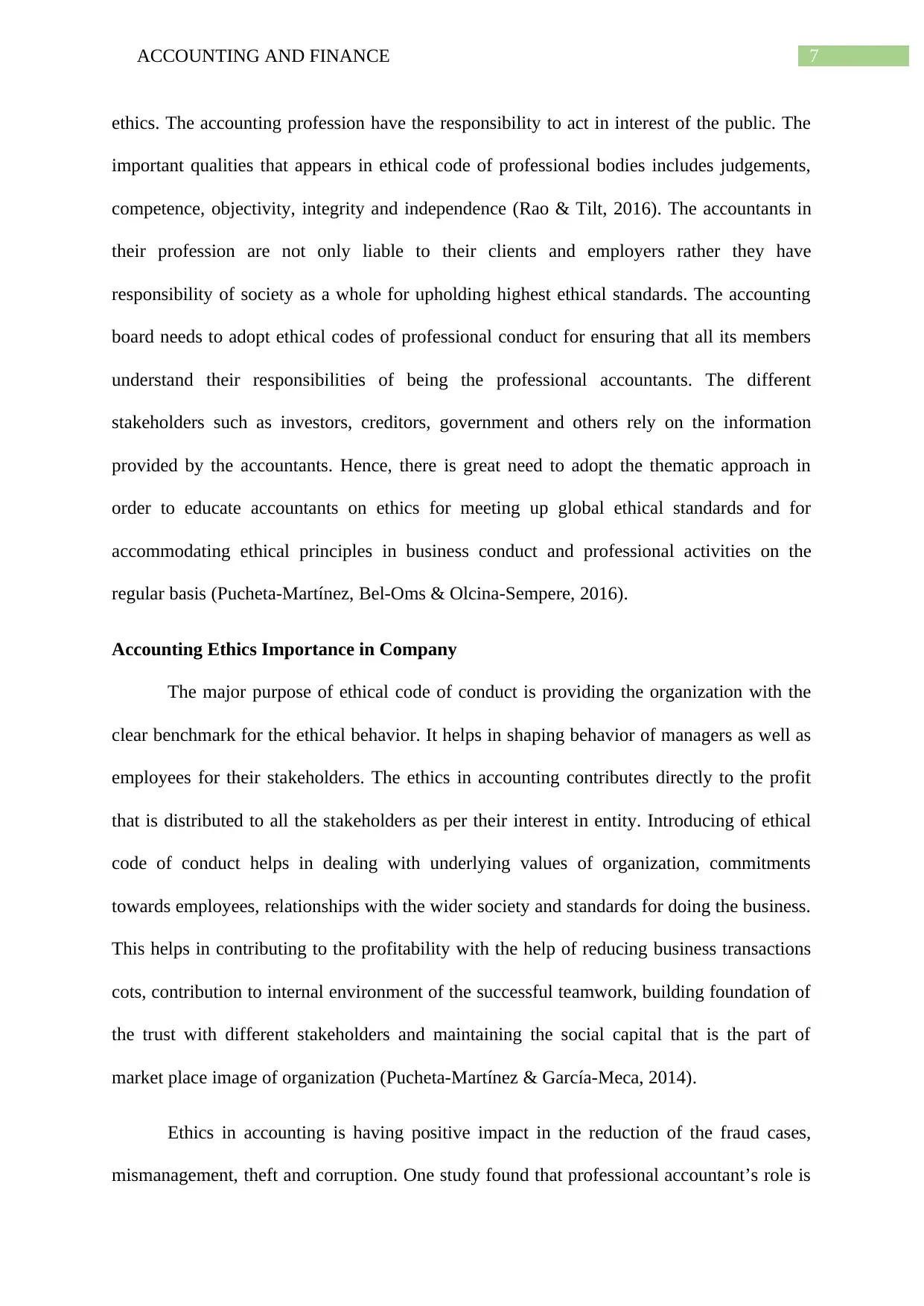
7ACCOUNTING AND FINANCE
ethics. The accounting profession have the responsibility to act in interest of the public. The
important qualities that appears in ethical code of professional bodies includes judgements,
competence, objectivity, integrity and independence (Rao & Tilt, 2016). The accountants in
their profession are not only liable to their clients and employers rather they have
responsibility of society as a whole for upholding highest ethical standards. The accounting
board needs to adopt ethical codes of professional conduct for ensuring that all its members
understand their responsibilities of being the professional accountants. The different
stakeholders such as investors, creditors, government and others rely on the information
provided by the accountants. Hence, there is great need to adopt the thematic approach in
order to educate accountants on ethics for meeting up global ethical standards and for
accommodating ethical principles in business conduct and professional activities on the
regular basis (Pucheta‐Martínez, Bel‐Oms & Olcina‐Sempere, 2016).
Accounting Ethics Importance in Company
The major purpose of ethical code of conduct is providing the organization with the
clear benchmark for the ethical behavior. It helps in shaping behavior of managers as well as
employees for their stakeholders. The ethics in accounting contributes directly to the profit
that is distributed to all the stakeholders as per their interest in entity. Introducing of ethical
code of conduct helps in dealing with underlying values of organization, commitments
towards employees, relationships with the wider society and standards for doing the business.
This helps in contributing to the profitability with the help of reducing business transactions
cots, contribution to internal environment of the successful teamwork, building foundation of
the trust with different stakeholders and maintaining the social capital that is the part of
market place image of organization (Pucheta‐Martínez & García‐Meca, 2014).
Ethics in accounting is having positive impact in the reduction of the fraud cases,
mismanagement, theft and corruption. One study found that professional accountant’s role is
ethics. The accounting profession have the responsibility to act in interest of the public. The
important qualities that appears in ethical code of professional bodies includes judgements,
competence, objectivity, integrity and independence (Rao & Tilt, 2016). The accountants in
their profession are not only liable to their clients and employers rather they have
responsibility of society as a whole for upholding highest ethical standards. The accounting
board needs to adopt ethical codes of professional conduct for ensuring that all its members
understand their responsibilities of being the professional accountants. The different
stakeholders such as investors, creditors, government and others rely on the information
provided by the accountants. Hence, there is great need to adopt the thematic approach in
order to educate accountants on ethics for meeting up global ethical standards and for
accommodating ethical principles in business conduct and professional activities on the
regular basis (Pucheta‐Martínez, Bel‐Oms & Olcina‐Sempere, 2016).
Accounting Ethics Importance in Company
The major purpose of ethical code of conduct is providing the organization with the
clear benchmark for the ethical behavior. It helps in shaping behavior of managers as well as
employees for their stakeholders. The ethics in accounting contributes directly to the profit
that is distributed to all the stakeholders as per their interest in entity. Introducing of ethical
code of conduct helps in dealing with underlying values of organization, commitments
towards employees, relationships with the wider society and standards for doing the business.
This helps in contributing to the profitability with the help of reducing business transactions
cots, contribution to internal environment of the successful teamwork, building foundation of
the trust with different stakeholders and maintaining the social capital that is the part of
market place image of organization (Pucheta‐Martínez & García‐Meca, 2014).
Ethics in accounting is having positive impact in the reduction of the fraud cases,
mismanagement, theft and corruption. One study found that professional accountant’s role is
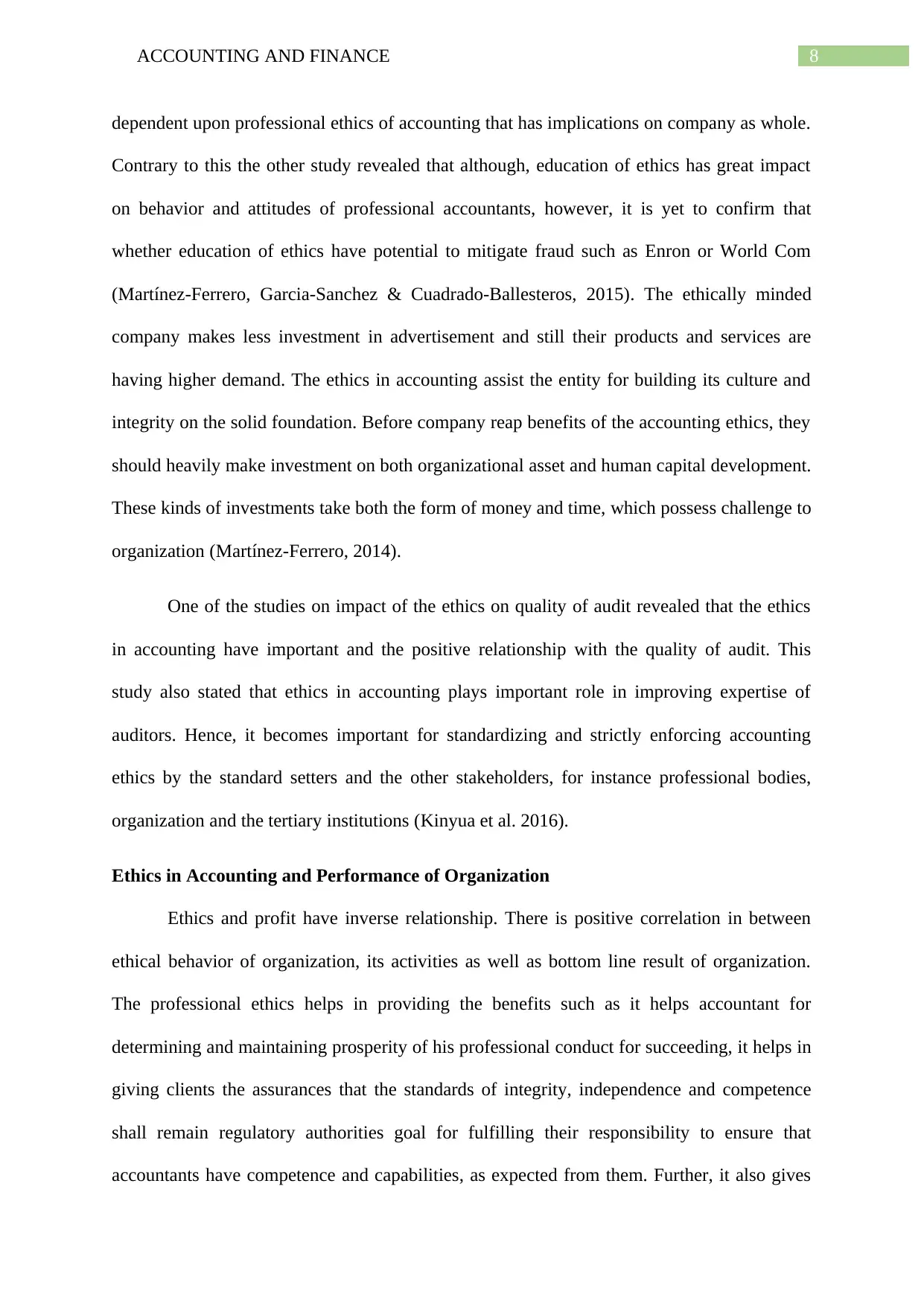
8ACCOUNTING AND FINANCE
dependent upon professional ethics of accounting that has implications on company as whole.
Contrary to this the other study revealed that although, education of ethics has great impact
on behavior and attitudes of professional accountants, however, it is yet to confirm that
whether education of ethics have potential to mitigate fraud such as Enron or World Com
(Martínez‐Ferrero, Garcia‐Sanchez & Cuadrado‐Ballesteros, 2015). The ethically minded
company makes less investment in advertisement and still their products and services are
having higher demand. The ethics in accounting assist the entity for building its culture and
integrity on the solid foundation. Before company reap benefits of the accounting ethics, they
should heavily make investment on both organizational asset and human capital development.
These kinds of investments take both the form of money and time, which possess challenge to
organization (Martínez-Ferrero, 2014).
One of the studies on impact of the ethics on quality of audit revealed that the ethics
in accounting have important and the positive relationship with the quality of audit. This
study also stated that ethics in accounting plays important role in improving expertise of
auditors. Hence, it becomes important for standardizing and strictly enforcing accounting
ethics by the standard setters and the other stakeholders, for instance professional bodies,
organization and the tertiary institutions (Kinyua et al. 2016).
Ethics in Accounting and Performance of Organization
Ethics and profit have inverse relationship. There is positive correlation in between
ethical behavior of organization, its activities as well as bottom line result of organization.
The professional ethics helps in providing the benefits such as it helps accountant for
determining and maintaining prosperity of his professional conduct for succeeding, it helps in
giving clients the assurances that the standards of integrity, independence and competence
shall remain regulatory authorities goal for fulfilling their responsibility to ensure that
accountants have competence and capabilities, as expected from them. Further, it also gives
dependent upon professional ethics of accounting that has implications on company as whole.
Contrary to this the other study revealed that although, education of ethics has great impact
on behavior and attitudes of professional accountants, however, it is yet to confirm that
whether education of ethics have potential to mitigate fraud such as Enron or World Com
(Martínez‐Ferrero, Garcia‐Sanchez & Cuadrado‐Ballesteros, 2015). The ethically minded
company makes less investment in advertisement and still their products and services are
having higher demand. The ethics in accounting assist the entity for building its culture and
integrity on the solid foundation. Before company reap benefits of the accounting ethics, they
should heavily make investment on both organizational asset and human capital development.
These kinds of investments take both the form of money and time, which possess challenge to
organization (Martínez-Ferrero, 2014).
One of the studies on impact of the ethics on quality of audit revealed that the ethics
in accounting have important and the positive relationship with the quality of audit. This
study also stated that ethics in accounting plays important role in improving expertise of
auditors. Hence, it becomes important for standardizing and strictly enforcing accounting
ethics by the standard setters and the other stakeholders, for instance professional bodies,
organization and the tertiary institutions (Kinyua et al. 2016).
Ethics in Accounting and Performance of Organization
Ethics and profit have inverse relationship. There is positive correlation in between
ethical behavior of organization, its activities as well as bottom line result of organization.
The professional ethics helps in providing the benefits such as it helps accountant for
determining and maintaining prosperity of his professional conduct for succeeding, it helps in
giving clients the assurances that the standards of integrity, independence and competence
shall remain regulatory authorities goal for fulfilling their responsibility to ensure that
accountants have competence and capabilities, as expected from them. Further, it also gives
⊘ This is a preview!⊘
Do you want full access?
Subscribe today to unlock all pages.

Trusted by 1+ million students worldwide
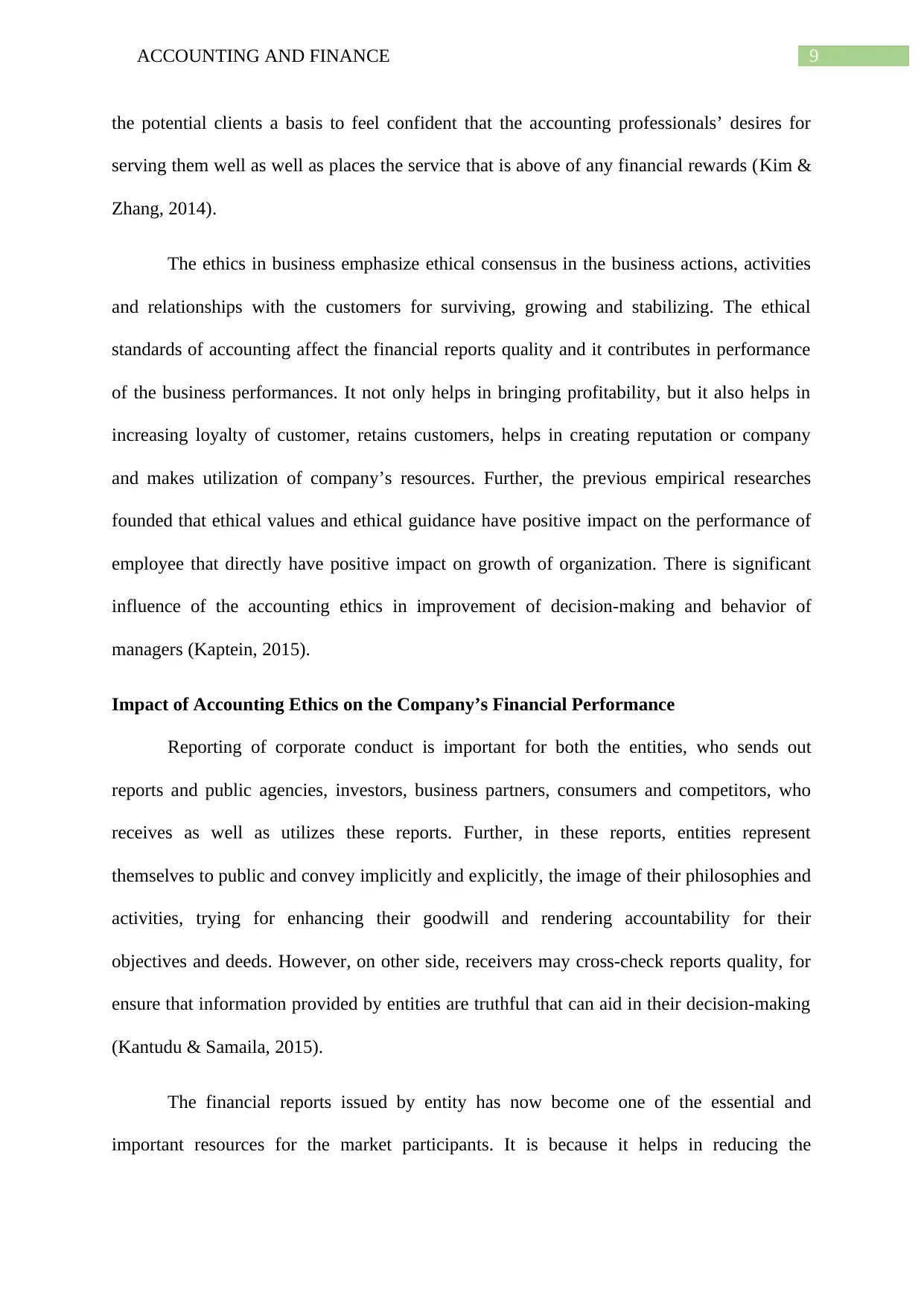
9ACCOUNTING AND FINANCE
the potential clients a basis to feel confident that the accounting professionals’ desires for
serving them well as well as places the service that is above of any financial rewards (Kim &
Zhang, 2014).
The ethics in business emphasize ethical consensus in the business actions, activities
and relationships with the customers for surviving, growing and stabilizing. The ethical
standards of accounting affect the financial reports quality and it contributes in performance
of the business performances. It not only helps in bringing profitability, but it also helps in
increasing loyalty of customer, retains customers, helps in creating reputation or company
and makes utilization of company’s resources. Further, the previous empirical researches
founded that ethical values and ethical guidance have positive impact on the performance of
employee that directly have positive impact on growth of organization. There is significant
influence of the accounting ethics in improvement of decision-making and behavior of
managers (Kaptein, 2015).
Impact of Accounting Ethics on the Company’s Financial Performance
Reporting of corporate conduct is important for both the entities, who sends out
reports and public agencies, investors, business partners, consumers and competitors, who
receives as well as utilizes these reports. Further, in these reports, entities represent
themselves to public and convey implicitly and explicitly, the image of their philosophies and
activities, trying for enhancing their goodwill and rendering accountability for their
objectives and deeds. However, on other side, receivers may cross-check reports quality, for
ensure that information provided by entities are truthful that can aid in their decision-making
(Kantudu & Samaila, 2015).
The financial reports issued by entity has now become one of the essential and
important resources for the market participants. It is because it helps in reducing the
the potential clients a basis to feel confident that the accounting professionals’ desires for
serving them well as well as places the service that is above of any financial rewards (Kim &
Zhang, 2014).
The ethics in business emphasize ethical consensus in the business actions, activities
and relationships with the customers for surviving, growing and stabilizing. The ethical
standards of accounting affect the financial reports quality and it contributes in performance
of the business performances. It not only helps in bringing profitability, but it also helps in
increasing loyalty of customer, retains customers, helps in creating reputation or company
and makes utilization of company’s resources. Further, the previous empirical researches
founded that ethical values and ethical guidance have positive impact on the performance of
employee that directly have positive impact on growth of organization. There is significant
influence of the accounting ethics in improvement of decision-making and behavior of
managers (Kaptein, 2015).
Impact of Accounting Ethics on the Company’s Financial Performance
Reporting of corporate conduct is important for both the entities, who sends out
reports and public agencies, investors, business partners, consumers and competitors, who
receives as well as utilizes these reports. Further, in these reports, entities represent
themselves to public and convey implicitly and explicitly, the image of their philosophies and
activities, trying for enhancing their goodwill and rendering accountability for their
objectives and deeds. However, on other side, receivers may cross-check reports quality, for
ensure that information provided by entities are truthful that can aid in their decision-making
(Kantudu & Samaila, 2015).
The financial reports issued by entity has now become one of the essential and
important resources for the market participants. It is because it helps in reducing the
Paraphrase This Document
Need a fresh take? Get an instant paraphrase of this document with our AI Paraphraser
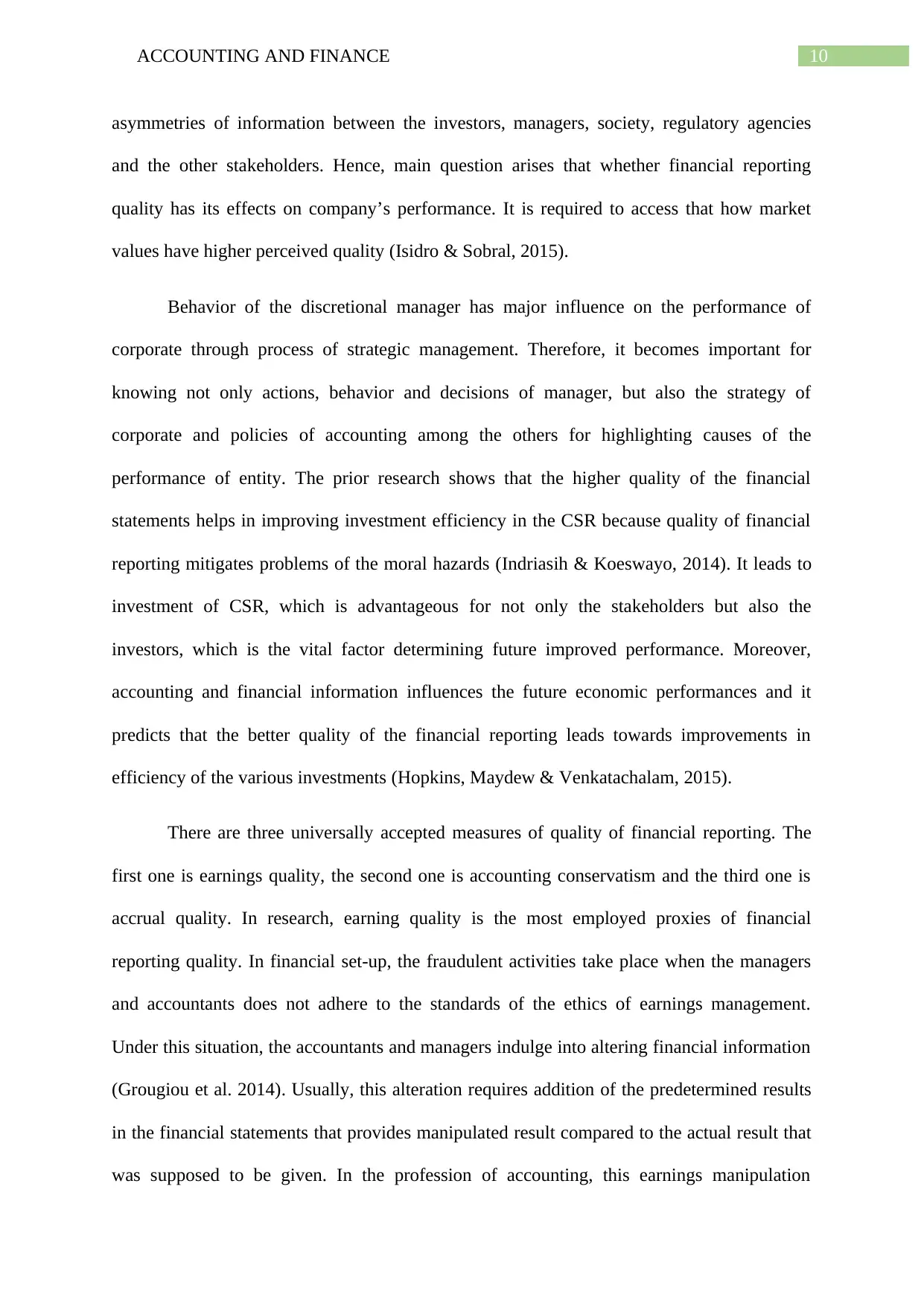
10ACCOUNTING AND FINANCE
asymmetries of information between the investors, managers, society, regulatory agencies
and the other stakeholders. Hence, main question arises that whether financial reporting
quality has its effects on company’s performance. It is required to access that how market
values have higher perceived quality (Isidro & Sobral, 2015).
Behavior of the discretional manager has major influence on the performance of
corporate through process of strategic management. Therefore, it becomes important for
knowing not only actions, behavior and decisions of manager, but also the strategy of
corporate and policies of accounting among the others for highlighting causes of the
performance of entity. The prior research shows that the higher quality of the financial
statements helps in improving investment efficiency in the CSR because quality of financial
reporting mitigates problems of the moral hazards (Indriasih & Koeswayo, 2014). It leads to
investment of CSR, which is advantageous for not only the stakeholders but also the
investors, which is the vital factor determining future improved performance. Moreover,
accounting and financial information influences the future economic performances and it
predicts that the better quality of the financial reporting leads towards improvements in
efficiency of the various investments (Hopkins, Maydew & Venkatachalam, 2015).
There are three universally accepted measures of quality of financial reporting. The
first one is earnings quality, the second one is accounting conservatism and the third one is
accrual quality. In research, earning quality is the most employed proxies of financial
reporting quality. In financial set-up, the fraudulent activities take place when the managers
and accountants does not adhere to the standards of the ethics of earnings management.
Under this situation, the accountants and managers indulge into altering financial information
(Grougiou et al. 2014). Usually, this alteration requires addition of the predetermined results
in the financial statements that provides manipulated result compared to the actual result that
was supposed to be given. In the profession of accounting, this earnings manipulation
asymmetries of information between the investors, managers, society, regulatory agencies
and the other stakeholders. Hence, main question arises that whether financial reporting
quality has its effects on company’s performance. It is required to access that how market
values have higher perceived quality (Isidro & Sobral, 2015).
Behavior of the discretional manager has major influence on the performance of
corporate through process of strategic management. Therefore, it becomes important for
knowing not only actions, behavior and decisions of manager, but also the strategy of
corporate and policies of accounting among the others for highlighting causes of the
performance of entity. The prior research shows that the higher quality of the financial
statements helps in improving investment efficiency in the CSR because quality of financial
reporting mitigates problems of the moral hazards (Indriasih & Koeswayo, 2014). It leads to
investment of CSR, which is advantageous for not only the stakeholders but also the
investors, which is the vital factor determining future improved performance. Moreover,
accounting and financial information influences the future economic performances and it
predicts that the better quality of the financial reporting leads towards improvements in
efficiency of the various investments (Hopkins, Maydew & Venkatachalam, 2015).
There are three universally accepted measures of quality of financial reporting. The
first one is earnings quality, the second one is accounting conservatism and the third one is
accrual quality. In research, earning quality is the most employed proxies of financial
reporting quality. In financial set-up, the fraudulent activities take place when the managers
and accountants does not adhere to the standards of the ethics of earnings management.
Under this situation, the accountants and managers indulge into altering financial information
(Grougiou et al. 2014). Usually, this alteration requires addition of the predetermined results
in the financial statements that provides manipulated result compared to the actual result that
was supposed to be given. In the profession of accounting, this earnings manipulation
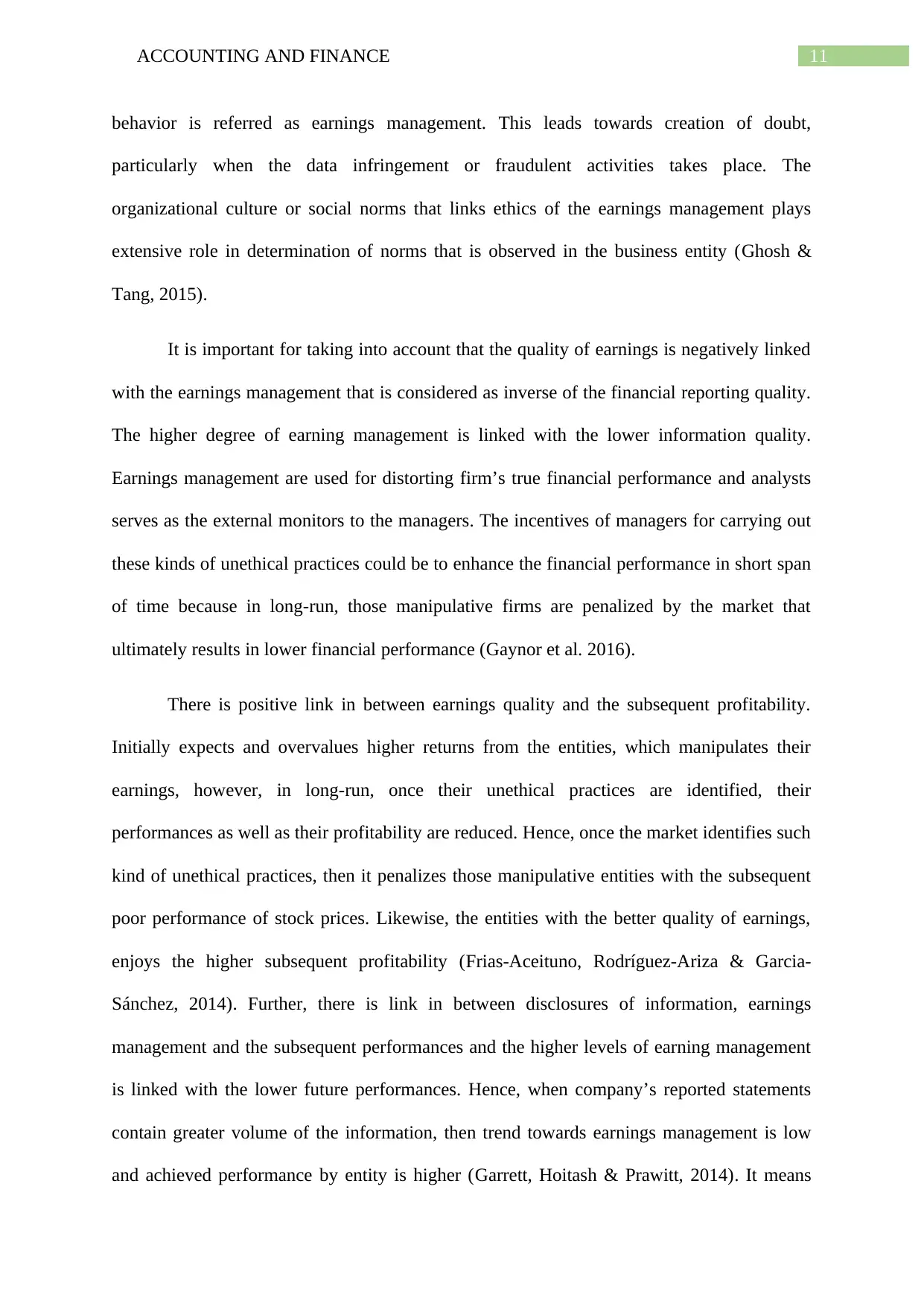
11ACCOUNTING AND FINANCE
behavior is referred as earnings management. This leads towards creation of doubt,
particularly when the data infringement or fraudulent activities takes place. The
organizational culture or social norms that links ethics of the earnings management plays
extensive role in determination of norms that is observed in the business entity (Ghosh &
Tang, 2015).
It is important for taking into account that the quality of earnings is negatively linked
with the earnings management that is considered as inverse of the financial reporting quality.
The higher degree of earning management is linked with the lower information quality.
Earnings management are used for distorting firm’s true financial performance and analysts
serves as the external monitors to the managers. The incentives of managers for carrying out
these kinds of unethical practices could be to enhance the financial performance in short span
of time because in long-run, those manipulative firms are penalized by the market that
ultimately results in lower financial performance (Gaynor et al. 2016).
There is positive link in between earnings quality and the subsequent profitability.
Initially expects and overvalues higher returns from the entities, which manipulates their
earnings, however, in long-run, once their unethical practices are identified, their
performances as well as their profitability are reduced. Hence, once the market identifies such
kind of unethical practices, then it penalizes those manipulative entities with the subsequent
poor performance of stock prices. Likewise, the entities with the better quality of earnings,
enjoys the higher subsequent profitability (Frias‐Aceituno, Rodríguez‐Ariza & Garcia‐
Sánchez, 2014). Further, there is link in between disclosures of information, earnings
management and the subsequent performances and the higher levels of earning management
is linked with the lower future performances. Hence, when company’s reported statements
contain greater volume of the information, then trend towards earnings management is low
and achieved performance by entity is higher (Garrett, Hoitash & Prawitt, 2014). It means
behavior is referred as earnings management. This leads towards creation of doubt,
particularly when the data infringement or fraudulent activities takes place. The
organizational culture or social norms that links ethics of the earnings management plays
extensive role in determination of norms that is observed in the business entity (Ghosh &
Tang, 2015).
It is important for taking into account that the quality of earnings is negatively linked
with the earnings management that is considered as inverse of the financial reporting quality.
The higher degree of earning management is linked with the lower information quality.
Earnings management are used for distorting firm’s true financial performance and analysts
serves as the external monitors to the managers. The incentives of managers for carrying out
these kinds of unethical practices could be to enhance the financial performance in short span
of time because in long-run, those manipulative firms are penalized by the market that
ultimately results in lower financial performance (Gaynor et al. 2016).
There is positive link in between earnings quality and the subsequent profitability.
Initially expects and overvalues higher returns from the entities, which manipulates their
earnings, however, in long-run, once their unethical practices are identified, their
performances as well as their profitability are reduced. Hence, once the market identifies such
kind of unethical practices, then it penalizes those manipulative entities with the subsequent
poor performance of stock prices. Likewise, the entities with the better quality of earnings,
enjoys the higher subsequent profitability (Frias‐Aceituno, Rodríguez‐Ariza & Garcia‐
Sánchez, 2014). Further, there is link in between disclosures of information, earnings
management and the subsequent performances and the higher levels of earning management
is linked with the lower future performances. Hence, when company’s reported statements
contain greater volume of the information, then trend towards earnings management is low
and achieved performance by entity is higher (Garrett, Hoitash & Prawitt, 2014). It means
⊘ This is a preview!⊘
Do you want full access?
Subscribe today to unlock all pages.

Trusted by 1+ million students worldwide
1 out of 20
Related Documents
Your All-in-One AI-Powered Toolkit for Academic Success.
+13062052269
info@desklib.com
Available 24*7 on WhatsApp / Email
![[object Object]](/_next/static/media/star-bottom.7253800d.svg)
Unlock your academic potential
Copyright © 2020–2026 A2Z Services. All Rights Reserved. Developed and managed by ZUCOL.




